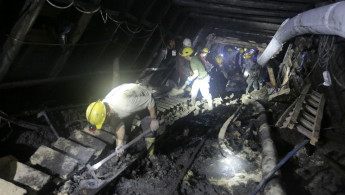Algerian government pushes to improve miners' rights
In addition, Gara Djebilet and Mecheri Abdelaziz mines in the southern Tindouf province are estimated to contain a 300,000,000 ton reserve of iron ore, making this one of the largest global reserves, into which the government intends to invest approximately 20 billion dollars.
Algeria also has zinc and lead mines in Bejaia, in the north of the country, that has a reserve of 60 million tons, the third largest in the world. With these vast mineral resources, foreign companies usually control labour conditions, which translates into the exploitation and mistreatment of miners.
Lack of safety regulations
Most miners complain about the absence of safety and health procedures at the mines, which has caused repeated labour disputes and strikes.
| Negligence has caused the death of 13 miners and injured another 400 over the past four years. |
Ibrahim Abdullah, a miner at Ouenza mine told al-Araby al-Jadeed: "Workers have gone on strike multiple times because of the poor safety conditions in the mines, as well as poor medical care and the arbitrary dismissal of workers by foreign contractors."
Masoud Mohammad, who has worked in the mines for over 25 years, said: "Foreign contractors have exploited workers to the highest degree in return for wages that do not cover the basic daily costs of living." According to Masoud, negligence has caused the death of 13 miners and injured another 400 over the past four years.
This has caused Youcef Yousfi, the minister of energy and mines, to strongly criticise the way some foreign companies have been running Algerian mines. Yousfi argued: "They have done everything except exploit the mines in a good manner". The minister ordered government field visits to all operating mines and quarries to inspect working conditions and insure they adhere to safety regulations.
Mohammad Bakay, secretary general of the National Union for Mine Workers said recent steps taken by the government have helped improve working conditions, and increased safety. He told al-Araby al-Jadeed: "Workers are being given various forms of social security compensation, including pensions, and their wages have increased. The average gold mine worker is paid $1000 a month, while other mine workers' wages range from $500 to $600 a month. This compares to an average national salary of $370".
However, Amam Tayyib, secretary general of the union for non-metal mine workers, believes the government has not taken enough action. He explained that during the past few years many deaths have been caused by mines collapsing, causing companies to tighten safety procedures but more still needs to be done. Tayyib said: "Workers undergo complete medical check ups every six months to monitor their health, however serious measures need to be adopted to combat silicosis and cancers that are common among miners."
This article is an edited translation from our Arabic edition.



